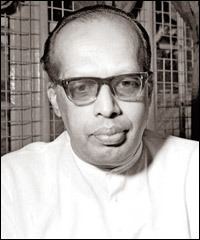Other uses
- Tikiri (elephant) (1949–2019), Sri Lankan elephant
- Tikiri (Ceylonese newspaper) , Ceylonese newspaper
- Tikiri Suwanda , film
- Ran Tikiri Sina, song
Tikiri is a village in India. Tikiri may also refer to:

Navaratne Rajakaruna Wasala Mudiyanselage Tikiri Bandara Ilangaratne, popularly as T. B. Ilangaratne, was a Sri Lankan politician, author, dramatist, and theater actor. He was a Member of Parliament for Kandy, Galaha, Hewaheta and Kolonnawa in Colombo district. He served as the Sri Lankan Cabinet Minister of Labour, Housing, Social Services, Finance, Commerce, Food, Trade and Shipping and in other government positions in a career spanning three decades. He established the Employees' Provident Fund, Ceylon Petroleum Corporation and Sri Lanka Insurance Corporation and the People's Bank while in office. As a writer, Ilangaratne is best known for writing Amba Yaluwo (1957), a popular children's novel.
Rajasinghe I also known as the lion of Sitawaka was a king of Sitawaka, known for his patriotism and fight against the Portuguese invasion of Sri Lanka. Born as Tikiri Bandara to King Mayadunne, he received the name "Rajasinha" after the fierce Battle of Mulleriyawa.

The Kingdom of Sitawaka was a kingdom located in south-central Sri Lanka. It emerged from the division of the Kingdom of Kotte following the Spoiling of Vijayabahu in 1521. Over the course of the next seventy years it came to dominate much of the island. Sitawaka also offered fierce resistance to the Portuguese, who had arrived on the island in 1505. Despite its military successes, Sitawaka remained unstable, having to contend with repeated uprisings in its restive Kandyan territories, as well as a wide-ranging and often devastating conflict with the Portuguese. Sitawaka disintegrated soon after the death of its last king Rajasimha I in 1593.
The Battle of Mulleriyawa in 1559 was part of the Sinhalese–Portuguese War. It was one of the most decisive battles in Sri Lankan history and considered as the worst defeat of Portuguese during that period. According to local chronicles the marshlands of Mulleriyawa turned red with blood after the annihilation of the Portuguese. With this victory Sitawaka emerged as a military power which was able to challenge the Portuguese expansion.
Sir Tikiri Bandara Panabokke II, First Adigar, JP, UM was a Ceylonese, prominent colonial era legislator, lawyer and diplomat. He was the first Minister of Health in the State Council and second representative of the Government of Ceylon to India. He was the last person appointed by the British Government of Ceylon to the post of Adigar.
Theodore Braybrooke Panabokke was Sri Lankan politician, lawyer and diplomat. He was a former Parliamentary Secretary of Agriculture, Member of Parliament and Ceylon's High Commissioner to India. He was the Chancellor of the University of Peradeniya.
Sir Richard Aluwihare, was a Sri Lankan civil servant. He was the first Ceylonese Inspector General of Police and Ceylon's High Commissioner to India.

The Mahâ Adigâr was a Great Officer in the Amātya Mandalaya, or Sinhalese Council of State, in the Sinhalese Kingdoms of monarchical Sri Lanka. The office was second in power and dignity to the King. Like many of the existing high offices at the time it had combined legislative and judicial powers and functioned primarily equivalent to that of a prime minister and chief justice, but also had duties in the governance of a province. During the Kandyan period there were two Adigars, who were styled Mahâ Nilames, the Pallegampahê Mahâ Nilamê and the Udagampahê Mahâ Nilamê, the former taking precedence over the latter.
Sooriyakumara Wannisinghe Punchi Banda Bulankulame, OBE, JP was a Ceylonese politician, who was the former Cabinet Minister of Lands and Land Development in Dudley Senanayake's and John Kotelawala's government.
Vidyartha College is an all-male national school located in the Central Province of Sri Lanka. The college was founded in 1942 by the Vidyartha Society, and is currently run by the Government of Sri Lanka. The college has two sections: the primary section which includes grades 1–5; and the secondary section which includes students in grades 6–13.
The siege of Kotte was an offensive which took place during the Sinhalese–Portuguese War between 1557 and 1558. A 50,000-strong Sitawaka army led by King Mayadunne besieged Sri Jayawardenapura Kotte, the capital of Kotte Kingdom, for 12 months against a combined force of Portuguese and Lascarins led by Captain-major Dom Afonso Pereira de Lacerda. After receiving reinforcements from Mannar, Portuguese made a sally and succeeded in forcing the besiegers to withdraw. This siege marked the beginning of a series of battles between Portuguese and Sitawaka forces, and ultimately ended as Portuguese abandoned Sri Jayawardenapura Kotte in 1565.
Tikiri Bandara Panabokke I was a Ceylonese colonial-era legislator. He was the Kandyan Sinhalese member of the Legislative Council of Ceylon, a Police Magistrate for Kandy and acting Diyawadana Nilame. Panabokke along with L.T.R. Le Mesurier of the Ceylon Civil Service, translated into English Kandyan the Code of Law Kandian.
Wilfred Abeyratne Ratwatte was a Ceylonese politician.
Piyasena Tennakoon was a Ceylonese lawyer and politician.
Wijeratne Tikiri Bandara Karaliadda was a Ceylonese educator and politician.
Tikiri Banda Jayasundera was a Ceylonese politician. He was the member of Parliament of Sri Lanka from Udunuwara representing the Sri Lanka Freedom Party. He was defeated in the by D.B. Wijetunga in the 1965 general election. Jayasundera is deceased.
Bandara is both a given name and a surname. Notable people with the name include: